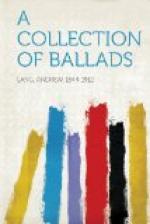“Maitland upon auld beird gray” is mentioned by Gawain Douglas, in his Palice of Honour, which the Shepherd can hardly have read, and Scott identified this Maitland with the ancestor of Lethington; his date was 1250-1296. On the whole, even the astute Shepherd, in his early days of authorship, could hardly have laid a plot so insidious, and the question of the authenticity and origin of the ballad (obvious interpolations apart) remains a mystery. Who could have forged it? It is, as an exercise in imitation, far beyond Hardyknute, and at least on a level with Sir Roland. The possibility of such forgeries is now very slight indeed, but vitiates early collections.
If we suspect Leyden, who alone had the necessary knowledge of antiquities, we are still met by the improbability of old Mrs. Hogg being engaged in the hoax. Moreover, Leyden was probably too keen an antiquary to take part in one of the deceptions which Ritson wished to punish so severely. Mr. Child expresses his strong and natural suspicions of the authenticity of the ballad, and Hogg is, certainly, a dubious source. He took in Jeffrey with the song of “Donald Macgillavray,” and instantly boasted of his triumph. He could not have kept his secret, after the death of Scott. These considerations must not be neglected, however suspicious “Auld, Maitland” may appear.
THE BROOMFIELD HILL
From Buchan’s Ballads of the North of Scotland. There are Elizabethan references to the poem, and a twelfth century romance turns on the main idea of sleep magically induced. The lover therein is more fortunate than the hero of the ballad, and, finally, overcomes the spell. The idea recurs in the Norse poetry.
WILLIE’S LADYE
Scott took this ballad from Mrs. Brown’s celebrated Manuscript. The kind of spell indicated was practised by Hera upon Alcmena, before the birth of Heracles. Analogous is the spell by binding witch-knots, practised by Simaetha on her lover, in the second Idyll of Theocritus. Montaigne has some curious remarks on these enchantments, explaining their power by what is now called “suggestion.” There is a Danish parallel to “Willie’s Ladye,” translated by Jamieson.




